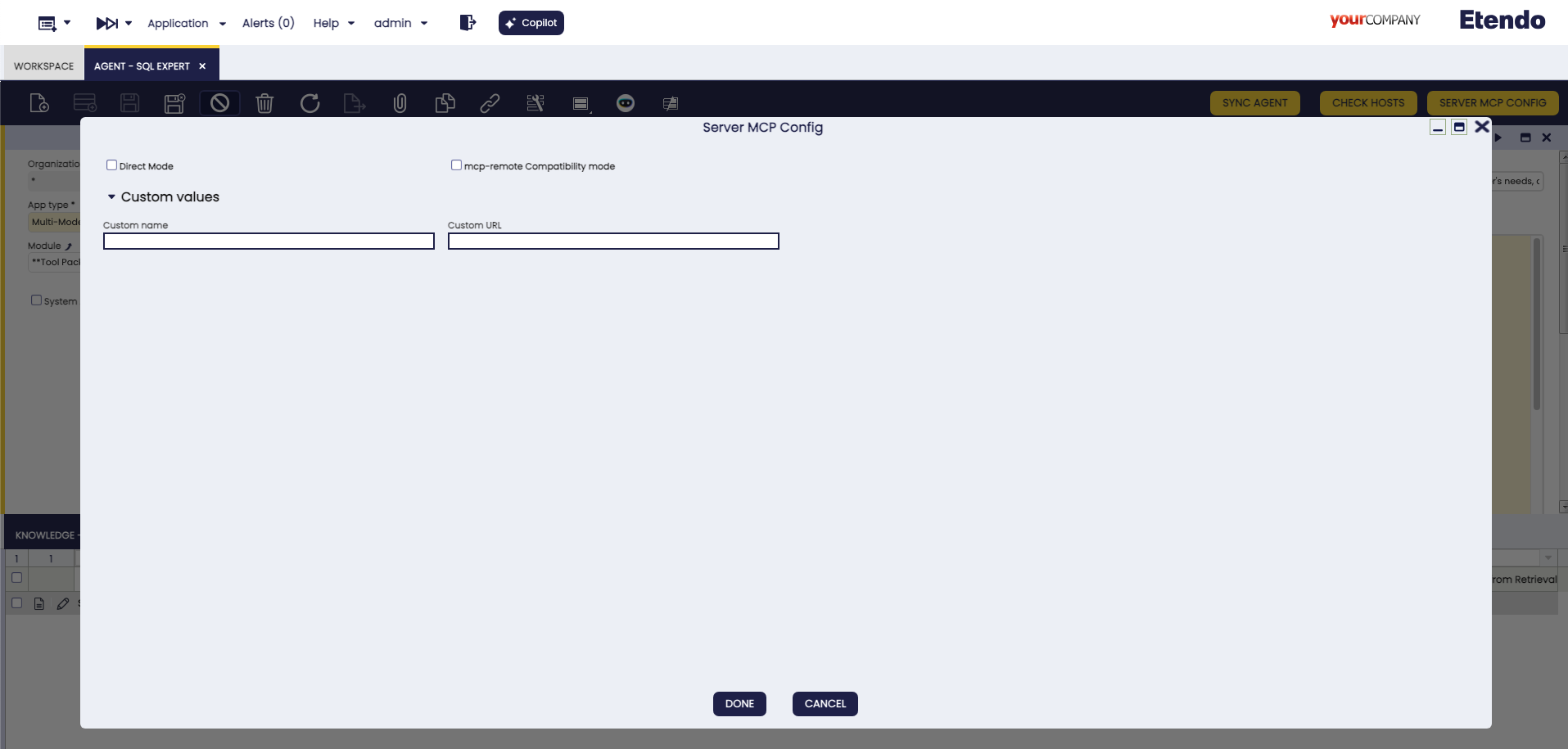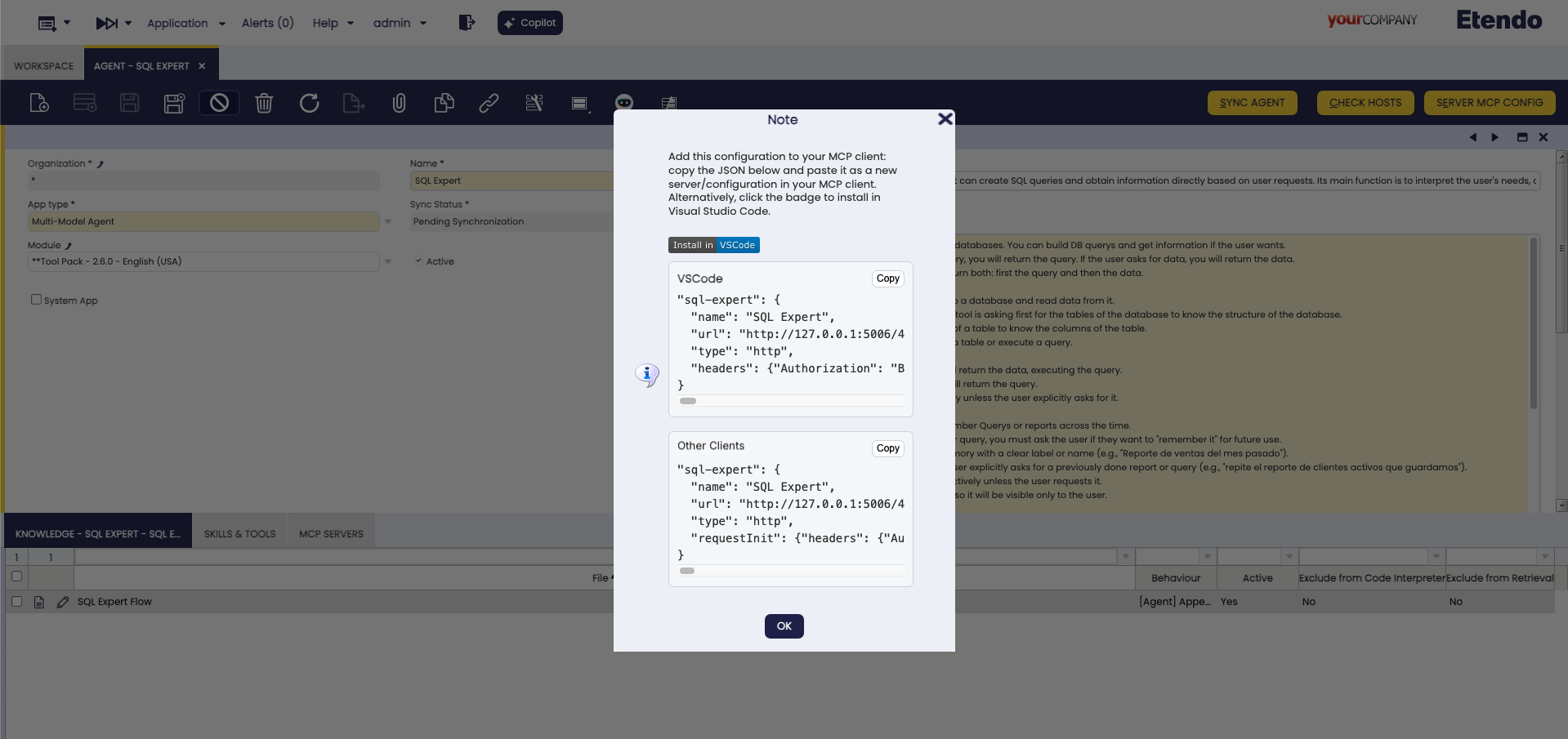How to use an Agent as MCP Server
Overview
IMPORTANT: THIS IS A BETA VERSION
It is under active development and may contain unstable or incomplete features. Use it at your own risk. The module behavior may change without notice. Do not use it in production environments.
This guide shows you how to connect to Etendo Copilot agents using the Model Context Protocol (MCP). Each agent automatically exposes an MCP server that you can connect to from various MCP-compatible clients like Claude Desktop, VS Code, Gemini CLI, and custom applications.
Each Etendo Copilot agent provides an MCP server endpoint that exposes:
- Tools: Agent capabilities (API calls, file operations, knowledge search).
- Prompts: Pre-configured templates for common tasks.
- Resources: Access to documents, configurations, and data.
Connection Modes
There are two types of communication with the MCP server, both established through the API exposed by each agent:
- Simple Mode: Provides access to the agent as an external "black box". The client interacts naturally with the agent, without visibility into its internal configuration, tools, or prompt.
- Direct Mode: Provides direct access to the agent’s prompt and tools. In this mode, the external client behaves as if it were an Etendo agent itself, with access to the same tools, data, and definitions available to the internal agent.
Choose how you want to interact with the agent:
| Mode | Description | Best for |
|---|---|---|
| Simple | Chat naturally with the agent | Conversations, questions, general use |
| Direct | Execute specific tools directly | Automation, workflows, development |
MCP Server Architecture in Etendo Copilot
Each Etendo Copilot agent automatically exposes an MCP server endpoint that provides:
- Interaction Tools: Tools that facilitate communication between the agent and the MCP Client, like
ask_agentfor sending questions and receiving answers. - Agent Tools: Functions that the agent can execute.
- Resources: Static or dynamic data that can be accessed (documents, configurations, logs, etc.).
- Prompts: Pre-configured prompt templates for common tasks.
The MCP server runs alongside the agent and communicates using HTTP transport with optional Server-Sent Events (SSE) for streaming responses.
Agent Types and Connection Modes
Etendo Copilot supports two kinds of agents, each with two connection modes. The agent type defines the role, and the mode defines how you interact with it.
| Agent Type | Simple Mode (Talk) | Direct Mode (Control) |
|---|---|---|
| Multi-Model | Use ask_agent to chat naturally |
Access all tools directly + get_agent_prompt for setup |
| LangGraph | Use ask_agent_supervisor to talk to supervisor |
Use ask_agent_<MemberName> for team members + get_agent_prompt |
Multi-Model Agent: A single agent that combines multiple AI models and tools.
- Simple Mode: Best for natural conversations. The agent picks the right tools automatically.
- Direct Mode: Best for workflows or integrations. You run tools yourself and can read the agent’s instructions.
LangGraph Agent: A supervisor that manages a team of specialized agents.
- Simple Mode: Talk to the supervisor, who delegates tasks to the right team members.
- Direct Mode: Talk directly to individual team members and see how the supervisor organizes them.
Choosing the Right Setup
| Use Case | Recommended Setup |
|---|---|
| Conversational chat interface | Any Agent + Simple Mode |
| Automated business workflows | Multi-Model + Direct Mode |
| Complex, multi-skill analysis | LangGraph + Simple Mode |
| Development and debugging | Any Agent + Direct Mode |
| API integrations | Multi-Model + Direct Mode |
| Multi-domain problem solving | LangGraph + Simple Mode |
Step-by-Step Guide
Get MCP Configuration
Application > Service > Copilot > Agent
- Open the Agent window in Etendo
- Select your agent and click "Server MCP Config" button.
-
Configure connection options:
- Direct Mode: Check for tool execution, uncheck for conversation.
- MCP-remote compatibility: Check for better client compatibility.
- Custom values: Optional URL and name overrides.
MCP-remote Compatibility Mode
What it does: Uses the
mcp-remotelibrary to add compatibility for MCP clients that don't handleHTTPtransport with authentication headers correctly.When to use:
- Claude Desktop: Requires this mode for proper authentication.
- Some IDE extensions that have
HTTPtransport limitations.
Configuration difference:
- Standard mode: Direct HTTP configuration with headers.
- Compatibility mode: Uses
npx mcp-remotewrapper command.
-
Copy the generated configuration from the popup
Localhost Development Warning
If you see this message: "The MCP URL begins with
http://localhost, which only works in development environments"- What it means: The generated URL is only accessible from the same machine
- For production use: Configure the
context.url.copilot.mcpproperty in Etendo to use your public domain instead of localhost - For external access: Use the Custom URL field in the dialog to specify your public Copilot host address
Example Configurations
VS Code Configuration
Add to your VS Code settings:
"mcp": { "servers": { "etendoAgent": { "type": "http", "url": "http://localhost:5006/AGENT_ID/mcp", "headers": { "etendo-token": "Bearer your-token-here" } } } }Gemini CLI Configuration
Create or update your Gemini CLI config:
{ "mcpServers": { "etendoAgent": { "type": "http", "httpUrl": "http://localhost:5006/AGENT_ID/mcp/", "headers": { "etendo-token": "Bearer your-token-here" } } } }Claude Desktop Configuration
Add to your Claude Desktop config:
Test the Connection
-
Start your MCP client VS Code, Gemini CLI, Claude Desktop, etc.
-
Test basic connectivity:
-
Try agent interaction:
Simple Mode:
Direct Mode:
Connection Modes Explained
Simple Mode
- URL:
http://HOST:PORT/AGENT_ID/mcp - Tools:
ask_agent, basic utilities. - Use: Natural conversation with the agent.
Direct Mode
- URL:
http://HOST:PORT/AGENT_ID/direct/mcp - Tools: All agent tools +
get_agent_prompt. - Use: Direct tool execution and system access.
Use Cases
Simple Chat Interface
- User: "What can you help me with?"
- Agent: "I can help you with Etendo operations, data analysis, reporting, and more. What would you like to know?"
- User: "Show me recent sales data"
-
Agent:
[Uses internal tools]
"Here's the recent sales data: [displays results]"
Direct Tool Execution
-
Developer:
Uses
get_agent_prompttool -
Result: "I am an Etendo sales assistant with access to customer data and reporting tools..."*
-
Developer:
Uses
search_customerstool directlyParameters: {"query": "enterprise clients", "limit": 10}
-
Result: Returns list of enterprise customers without conversational wrapper
Troubleshooting
Common Issues
Connection fails:
- Verify the Etendo token is valid.
- Check the agent ID is correct.
- Ensure Copilot service is running.
Tools not available:
- Check user permissions in Etendo.
- Verify agent configuration includes required tools.
- Confirm connection mode matches your needs.
Authentication errors:
- Regenerate SWS token via
/sws/login. - Check token format includes "Bearer " prefix.
- Verify user has agent access permissions.
Security Note
Always use HTTPS in production environments. Keep your SWS tokens secure and never expose them in client-side code or public repositories.
This work is licensed under CC BY-SA 2.5 ES by Futit Services S.L..

